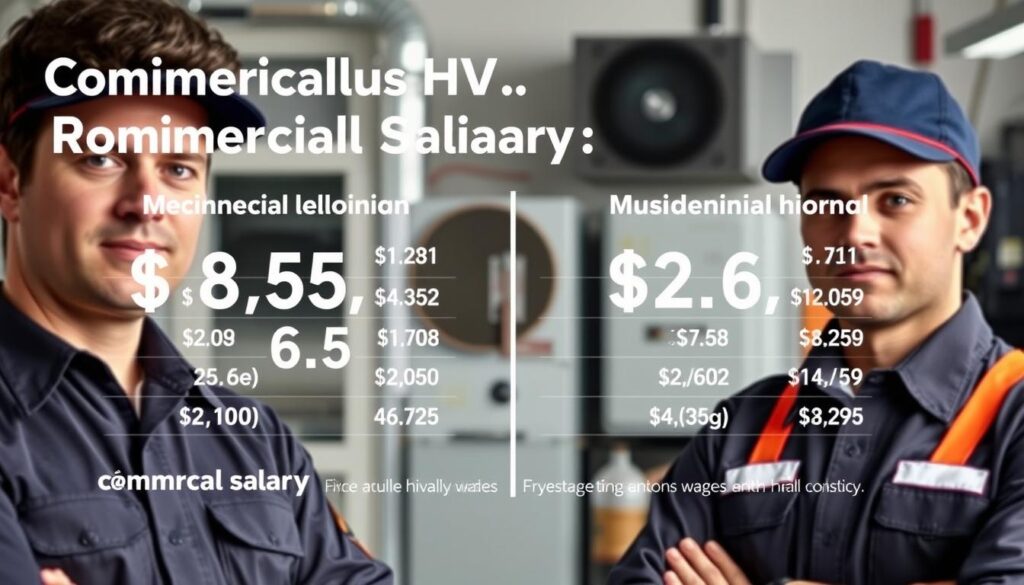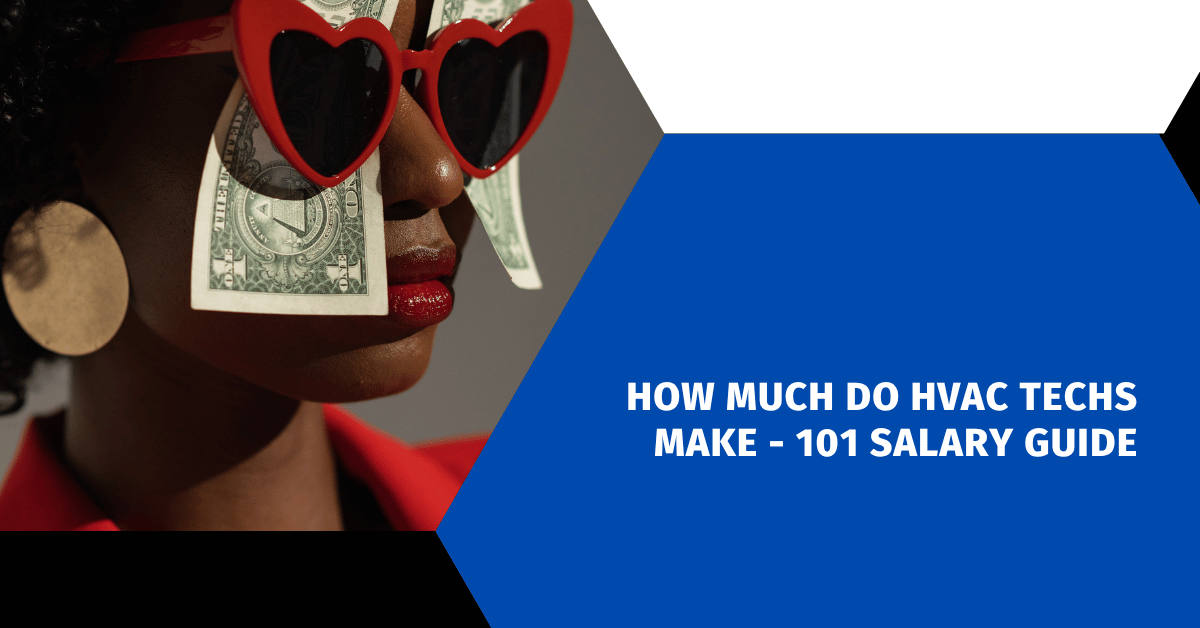Affiliate Disclosure
HVAC Guide Guys is a participant in the Amazon Services LLC Associates Program, an affiliate advertising program designed to provide a means for sites to earn advertising fees by advertising and linking to Amazon.
How Much Do HVAC Techs Make? Are you thinking about an HVAC technician career? It might surprise you how well it can pay. The heating, ventilation, and air conditioning field offers great earning chances.

It’s important to know how much HVAC techs earn. The Bureau of Labor Statistics says the median annual wage was $51,390 in May 2022. But, your actual pay can change a lot based on different things.
Your salary as an HVAC technician is more than just a number. It’s about the chances you have, the special skills you can learn, and how you grow in your career. From starting jobs to advanced technical roles, there’s a lot of room to grow in this key field.
Key Takeaways
- HVAC technicians earn a median annual wage of $51,390
- Salary increases with experience and specialization
- Where you live greatly affects how much you can earn
- Getting certified and taking advanced courses can raise your income
- The demand for HVAC techs is high, keeping jobs stable
Table of Contents
HVAC Technician Salary Overview
Knowing how much HVAC technicians make is key for those thinking about this career. The field offers many chances for skilled workers across the U.S.
National Average Base Salary
In 2024, HVAC techs can look forward to a good salary. The average yearly pay is about $49,500. Your actual pay depends on several important factors.
Salary Ranges Explained
HVAC technician pay varies a lot. Here’s a look at what you might earn:
- Entry-level techs: $21,500 – $35,000 a year
- Mid-career pros: $35,000 – $65,000 a year
- Experienced techs: $65,000 – $96,000 a year
Factors Influencing HVAC Income
Your earnings can change based on:
- Geographic location – Some places pay more
- Professional certifications
- Special skills
- Work experience
- Industry demand
Knowing these factors helps you plan your HVAC career for better pay.
Explore Our HVAC Shop
Looking for top-rated HVAC tools, parts, and accessories? Visit our shop and find the perfect solution for your needs.
Visit the ShopHow Much Do HVAC Techs Make by Experience Level
Your income as an HVAC technician can really grow with experience. Knowing how your earnings change over time helps you plan your career and money goals.
Starting out, HVAC techs get to learn a lot and build their skills. At first, your salary starts to show what you know and your basic skills.
| Experience Level | Average Annual Salary | Key Characteristics |
|---|---|---|
| Entry-Level (0-2 years) | $54,100 | Basic certifications, learning fundamental skills |
| Intermediate (2-4 years) | $65,700 | Advanced technical knowledge, increased job complexity |
| Senior (4-7 years) | $77,200 | Specialized skills, possible leadership roles |
As you get more experience, your salary goes up a lot. Strategic skill development is key to earning more.
- Pursue more certifications
- Learn specialized technical skills
- Get advice from experienced pros
- Look into advanced training
Staying committed to learning new things really helps your income. Invest in your skills, and watch your career and earnings grow.
Explore Our HVAC Shop
Looking for top-rated HVAC tools, parts, and accessories? Visit our shop and find the perfect solution for your needs.
Visit the ShopTop Paying States for HVAC Technicians
Your salary as an HVAC technician can change a lot based on where you work in the United States. The place you work in greatly affects how much you can earn. Some states pay much more than others.
Highest Paying Locations
Some states pay HVAC technicians a lot more than others. California, Nevada, and New York are the top spots for making money in this field.
- San Francisco leads with an impressive entry-level salary of $64,200
- New York City offers competitive wages around $58,500
- Los Angeles provides strong earning at $55,700
Cost of Living Considerations
High salaries are tempting, but remember the cost of living. A high hvac wage in an expensive city might not stretch as far as a moderate salary in a more affordable region.
| State | Average HVAC Salary | Cost of Living Index |
|---|---|---|
| California | $63,300 | 151.7 |
| Nevada | $56,750 | 113.4 |
| New York | $62,400 | 139.1 |
Regional Market Demands
Each region has its own needs and opportunities. Urban areas usually have more jobs and pay better than rural areas.
“Location is everything in the HVAC industry. Your skills combined with the right market can dramatically impact your earning.” – HVAC Industry Expert
Urban vs Rural HVAC Salaries
Your salary as an HVAC technician can change a lot based on your location. Urban and rural areas have different pay levels that affect how much you can earn.
In big cities, HVAC jobs pay more because there’s a high demand and complex systems. Places like New York, Chicago, and Los Angeles usually offer better pay. These cities also have more chances for specialized and advanced work.
- Urban HVAC technician average salary: $55,000 – $75,000
- Rural HVAC technician average salary: $45,000 – $60,000
Rural areas might pay less but have their own benefits. Smaller towns often have less competition, which can mean more steady work. Your salary in rural areas can also be boosted by lower living costs and loyal customers.
“Location matters significantly in determining your HVAC compensation strategy.” – Professional HVAC Industry Report
When choosing between urban and rural HVAC jobs, consider these points:
- Job Availability: Cities have more projects and work
- Competition: Rural areas have fewer technicians competing
- Living Expenses: Lower costs can make up for lower salaries
Your career choice should match your personal goals and preferences. Both urban and rural HVAC fields offer great opportunities for skilled technicians.
Career Growth and Advancement Opportunities
Your HVAC career has many paths to grow your income and skills. With the right steps, your starting job can lead to a rewarding career with many chances to move up.
Certification and Training Impact
Getting professional certifications can really boost your earnings. Licenses like the EPA Section 608 Certification or NATE (North American Technician Excellence) can make you more valuable in the market.
- EPA Section 608 Certification increases earning by 15-25%
- NATE certifications can raise salary by up to 10%
- Professional Engineer License can increase income by nearly 60%
Specialization Options
Learning specialized skills in HVAC can greatly increase your income. Key areas include:
- Commercial HVAC Systems
- Industrial Refrigeration
- Energy Efficiency Technologies
- Building Automation Systems
Management Track
For those who want to lead, HVAC offers management roles. Technical supervisors and project managers can earn 30-50% more than entry-level technicians. Planning your career and keeping your skills sharp are essential for these roles.
“Continuous learning is the minimum requirement for success in the HVAC industry.” – HVAC Industry Expert
Explore Our HVAC Shop
Looking for top-rated HVAC tools, parts, and accessories? Visit our shop and find the perfect solution for your needs.
Visit the ShopBenefits and Additional Compensation

When looking at hvac technician income, there’s more than just the base pay. HVAC pros get a wide range of benefits that boost their earnings and job happiness.
Your total hvac compensation includes many valuable perks. These make the job even more appealing:
- Health Insurance Coverage
- Retirement Savings Plans (401(k))
- Paid Time Off
- Disability Insurance
- Tool and Equipment Allowances
Many HVAC companies offer special perks to stand out in the job market. Fuel discounts are a big hit. They help technicians save on travel costs.
Retirement benefits often include matching for 401(k) contributions. This can add thousands of dollars a year. Some employers even offer bonuses for good performance, increasing your earnings even more.
“The right benefits package can add substantial value to your HVAC career,” says industry expert Michael Rodriguez.
Opportunities for professional growth are also part of the compensation. This includes sponsored training and certification programs. These investments can lead to better-paying jobs and career advancement.
Industry Outlook and Job Security
The HVAC industry is booming, with great opportunities for those looking for stable jobs. Your chances of earning well in HVAC are good, thanks to the growing job market.
Recent numbers show HVAC techs are in high demand. The field is expected to grow by 13% from 2018 to 2028. This means strong job security and good pay for skilled workers.
- Technological advancements driving industry expansion
- Increasing demand for energy-efficient systems
- Growing focus on sustainable building solutions
- Rising environmental consciousness
Several factors are driving this growth:
| Growth Driver | Impact on HVAC Industry |
|---|---|
| Green Technology | High demand for eco-friendly cooling/heating systems |
| Infrastructure Development | Increased construction of residential and commercial spaces |
| Equipment Modernization | Regular replacement of aging HVAC systems |
Professionals who stay updated with emerging technologies and maintain advanced certifications will be best positioned to capitalize on these industry trends.
Your HVAC career is looking up, with chances for learning and earning more. As buildings get more complex and focus on energy efficiency, skilled technicians will be in high demand.
Explore Our HVAC Shop
Looking for top-rated HVAC tools, parts, and accessories? Visit our shop and find the perfect solution for your needs.
Visit the ShopCommercial vs Residential HVAC Pay Differences
When looking at hvac technician salaries, it’s key to know the difference between commercial and residential HVAC work. The projects you choose can greatly affect your earnings.

Commercial and residential HVAC jobs have different paths and pay. Both need technical skills, but commercial HVAC pays more. This is because commercial jobs have more complex systems.
Project Scale Impact
Commercial HVAC projects are bigger and more complex. They need special skills. This can lead to:
- Higher hourly rates
- More substantial project-based compensation
- Longer-term employment contracts
Specialization Requirements
To grow in commercial HVAC, you need extra certifications and knowledge. Your pay goes up with skills in:
- Industrial refrigeration systems
- Advanced climate control technologies
- Energy-efficient design implementations
Earning Comparison
Commercial HVAC techs usually make 15-25% more than those in residential HVAC. The higher pay is for the extra complexity and technical needs.
Invest in continuous learning and specialized certifications to maximize your commercial HVAC career.
Conclusion
Learning about HVAC tech salaries shows a promising career with good pay. The hourly rate for HVAC techs varies, giving you chances to earn more as you grow. Your skills, specialization, and dedication to learning matter a lot.
Your HVAC career can bring great financial gains. Starting salaries are around $21,500, but top roles can exceed $100,000 a year. Your success depends on learning more, getting certifications, and finding your niche in HVAC services.
Choosing HVAC as a career is more than just the money. You’ll help keep places comfortable and energy-efficient. Plus, you’ll have job security in a field that’s always growing. With the right training, passion for solving problems, and career planning, you can make a good living and enjoy your work.
As technology and green living become more important, your HVAC skills will be needed even more. Keep learning, stay up-to-date with trends, and use your knowledge to increase your earnings. This field is dynamic and vital, and your skills will be in demand.

